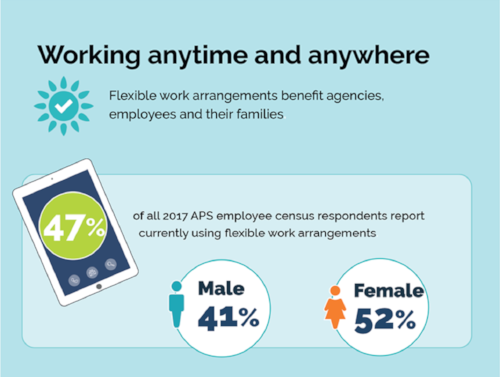Reigniting conversations about gender equality in the APS
How has the Australian Public Service (APS) been progressing and embedding gender equality, and are its efforts working? In the report Embedding Gender Equality in the Australian Public Service: Changing practices, changing cultures, UNSW Canberra's Dr Sue Williamson explains how the Australian Public Service Gender Equality Strategy has started an important conversation about the nature of equality, and where the APS may improve to achieve its goals. This piece was originally published in The Mandarin.
A report being released today finds that the Australian Public Service (APS) is well on the way towards progressing and embedding gender equality, but more remains to be done.
Our report, Embedding Gender Equality in the Australian Public Service: Changing practices, changing cultures, is based on extensive interviews and focus groups conducted in three government agencies. We examined what works to progress – and hinder – gender equality. One of the key findings is that Balancing the Future: The Australian Public Service Gender Equality Strategy 2016-2019 has reignited conversations about the need for the APS to remain a leader in gender equality in Australia.
The APS has traditionally been considered an ‘employer of choice’ for women. Further progress in key areas, such as rolling out ‘flexibility by default’, will enable women and men to better combine their work and care responsibilities, and create a more inclusive leadership culture.
In pockets of agencies where women still experienced fewer opportunities than their male counterparts, or worked in a traditionally ‘blokey’ area, such as ICT, people told us that the strategy has put gender equality back on the table. It is once again acceptable to talk about gender equality, and challenge workplace norms and practices which inhibit women’s progress through the ranks, or men’s ability to access flexible work arrangements.
Talking about gender equality also means sharing stories about what works. We heard many positive stories – about male employees who used the carer’s room to work, while looking after sick children, SES officers who publicly shared personal highlights with their teams, and middle managers who left work early to spend time with their family in the afternoon, logging on later in the evening.
Flexible working is on the rise. Source: APSC, State of the Service 2017.
We also heard about many initiatives and innovations to enable women to progress their careers. Reports of formal and informal mentoring were widespread, and training opportunities and leadership courses were ample. Secondments to other agencies were also widely utilised and considered to be valuable to career progression.
In one notable example, one agency facilitated a job sharing arrangement between two employees of different classification levels, an EL2 and an EL1. This arrangement provided greater flexibility for the more senior employee, an EL2 who converted from full-time to part-time employment, whilst providing supervisory experience for the more junior employee, an EL1 who assumed the responsibilities of the EL2 two days per week.
Part-time bias still part of the culture
We also found, however, that while great strides have been made, that some women have fewer opportunities than others. Many female part-time staff we spoke with perceived a lower level of opportunity, mobility, and career development.
Some of the barriers included a strong organisational attitude that full-time employees were more committed to their agencies and careers, and an underlying cultural assumption that part-time employees were less available or able to undertake urgent or challenging work. Australia has one of the highest rates of part-time work in the world, roles predominantly filled by women, so it’s important that these employees have access to the same opportunities as their full-time colleagues.
The conversations underway – about women in leadership, men and caring responsibilities, workplace flexibility – all indicate a healthy and committed APS well on the way to embedding gender equality.
Dr Sue Williamson is an academic at the UNSW Canberra Business School, and was recently named as a finalist in the Telstra Business Women’s Awards for the ACT for her work on progressing workplace gender equality.
Dr Meraiah Foley is a post-doctoral research fellow with the Public Service Research Group at UNSW Canberra, currently examining gender equality in the Australian public sector.

